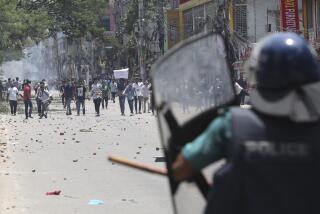Bhutto Cracks Down Before National Strike : Pakistan: Hundreds of premier’s political foes are jailed. Opposition says detentions are aimed at silencing critics.
- Share via
NEW DELHI — With political passions in Pakistan now running white-hot, Prime Minister Benazir Bhutto’s government detained and jailed hundreds, perhaps thousands, of political foes Monday on the eve of a nationwide strike.
It was an unprecedented crackdown by the populist prime minister, who was elected to office a year ago. Bhutto claimed those arrested were planning to destroy stores and other property during the work stoppage called for today by the opposition Pakistan Muslim League to force her resignation.
“Now, under the constitution, we have the responsibility to protect the life and property of the citizens, and that is why those people have been picked up,” Bhutto told the Reuters news agency. “Now they have been preempted, we believe there will be no threat on Oct. 11.”
The opposition accused Bhutto of resorting to tyrannical means to harass and muzzle her critics. The Muslim League’s implacable leader, former Prime Minister Nawaz Sharif, who was defeated by Bhutto in the October, 1993, elections, called on supporters to avoid arrest by going underground.
Nabib Baksh Kozo, a government spokesman in the Arabian Sea port city of Karachi, said the government arrested 1,100 people nationwide. But deputy Muslim League leader Haji Mohammed Nawaz Khokhar claimed that 10,000 people had been hauled into jail or put under guard at home over the weekend and Monday.
“I can’t leave my house,” Khokhar, a member of the National Assembly, said by telephone from Islamabad, the capital. “There is heavy police presence at the gate.”
Majid Malik, vice president of the Muslim League, told a Sunday news conference that many PML leaders would emerge from hiding today to head marches and speak at rallies. Women party workers, he said, would lie down on railroad tracks to paralyze Pakistan’s rail network.
Some admirers of Bhutto’s were uneasy about the prime minister’s action and fear it will only galvanize her adversaries. Bhutto also risked being hoist by her own petard, because she was elected to her first term as premier in 1988-90 after waging her own countrywide campaign of strikes and protests.
“We do believe that this agitational politics is against the democratic order,” she said of Sharif’s tactics.
Since a slim defeat in elections a year ago, Sharif, who was prime minister for 30 months until July, 1993, has been trying to force Bhutto from office. On Sept. 11 in Karachi, he launched a train-borne “caravan for liberation” and since then has called two general strikes that even Bhutto loyalists admitted were partial successes.
Perhaps the most serious development is the changing attitude of the Muhajir Quami Movement, which represents Urdu-speaking refugees who fled to Pakistan from India in 1947 and their descendants. Some news reports on the arrests said the majority of detainees were not from Sharif’s party but from the MQM, whose leader Altaf Hussain called recently for a separate province for the Muhajirs.
More to Read
Sign up for Essential California
The most important California stories and recommendations in your inbox every morning.
You may occasionally receive promotional content from the Los Angeles Times.










